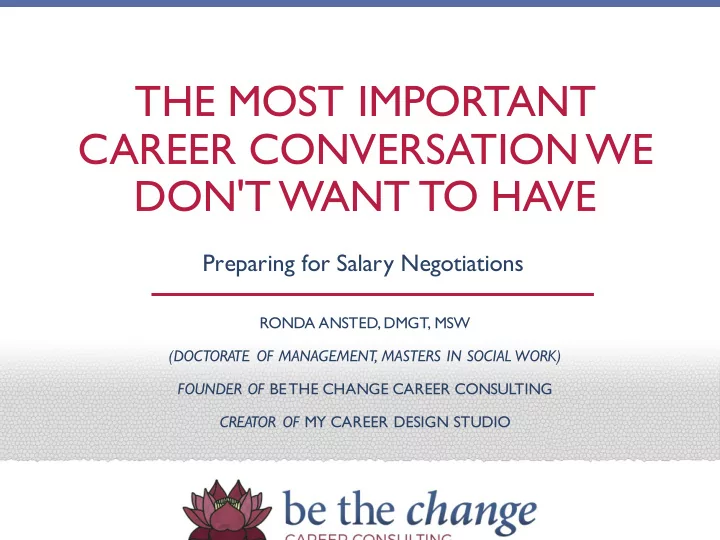

THE MOST IMPORTANT CAREER CONVERSATION WE DON'T WANT TO HAVE Preparing for Salary Negotiations RONDA ANSTED , DMGT, MSW (DOCTORATE OF MANAGEMENT, MASTERS IN SOCIAL WORK) FOUNDER OF BE THE CHANGE CAREER CONSULTING CREATOR OF MY CAREER DESIGN STUDIO
CAREER DESIGN PROCESS • Identifying your strengths, goals, interests, and passion (”Raw Materials”) • Prioritizing the most important components of your future career (“The Napkin Sketch”) • Creating your job search strategy: researching, networking, targeting organizations, and planning (“Career Design”) • Getting the job on your terms through a strong resume, social media profile, interview skills, and salary negotiation prep (“Career Creation T ools”) • T ake notes at bethechangecareers.com /salary
INTERNAL PREPARATION • Knowing your strengths • Knowing your value • Knowing your goals • Knowing your priorities q Salary q Flexible schedule q Job Title q Vacation time q Health benefits q Training/Education/Learning q Travel
EXTERNAL PREPARATION • Market research • https://www.careeronestop.org/toolkit/wages/find - salary.aspx • www.salary.com/category/salary/ • www.payscale.com/ • Informational interviews • Organizational research • http://www.glassdoor.com / • Informational interviews • Knowing your bottom line • Thinking creatively
THE NEGOTIATION PROCESS • Understanding leverage • Understanding timing • Prepping for the application • Prepping for the interview • Prepping for the job offer
THE NEGOTIATION PROCESS • Understanding leverage • Understanding timing • Prepping for the application • Prepping for the interview • Prepping for the job offer Chopra, Karen (2012) “Coaching Career Clients on Salary and Other Workplace Negotiations”
STRATEGIES FOR THE APPLICATION • Government applications • Online applications with required salary fields • 00000 • $70 - 80K neg • 75000 • Salary expectations required in the cover letter • “ I’m open to a salary in the $x0,000 to $ x 0,000 range depending on the final details of the position” • “SALARY EXPECTATIONS: $x0,000 to $ x 0,000, negotiable • “The job posting for this position asks for salary requirements. Because positions of this sort can vary greatly in compensation, I’m prepared to be flexible regarding salary; I’m eager to learn more about the position.”
STRATEGIES FOR THE INTERVIEW • Goal is to avoid giving a number, especially if you have avoided doing so • The salary expectation three - step: Avoid, Assure, Pivot • Examples in Avoiding • “ I’ll be happy to give you a salary range once I have a better understanding of the work expectations” • “My salary history is personal and I prefer to keep it private ” • Examples in Assuring • “I’m sure if everything else falls into place, salary won’t be an issue” • “Please know that I’m flexible depending on the work requirements” • “Based on my research, I’m confident it won’t be an issue ” • Examples in Pivoting • “If I take this job, and have an outstanding first year, what will I have accomplished?” • “How is performance evaluated in this organization?” • “Where do you see this organization heading in five years?” • “What would you say is the greatest strength of this organization ?”
STRATEGIES FOR THE JOB OFFER • Get it in writing • Ask for a reasonable time for consideration of their offer • Negotiate the job offer over the phone, preferably with everyone who needs to approve the offer • Start the conversation with something like “I’m really excited about this offer but after discussing it at home, I was wondering if there was anything more we could do in terms of salary ?” • Ask for more than you expect to get and as much as you can back - up by research; justify every ask • Stay positive, polite, and enthusiastic about the job • Let them feel like they’ve won
PRACTICE SCENARIO • Divide into groups of 4, then pair off within the groups • Strategize with your partner, you will then do a mock interview and job offer with someone in the opposite pair • This is for a job with a range in the $70s • [Private] Previous salary was $45,000 • [Private] Hiring manager has previously wasted a lot of time with people expecting a six - figure salary • [Private] Budgets are tight and previous employee made $65,000. Increasing the salary would mean that you’d have to cut costs somewhere else.
PRACTICE SCRIPT • Interview Question 1: “T ell me why I should hire you? • Interview Question 2: “What are your salary expectations?” • Answer with the Three Step • SWITCH • Job offer: $65,000 salary, two weeks of vacation, decent health benefits • INTERVIEWEE: Start job offer negotiations with a question • EMPLOYER: Be hesitant • INTERVIEWEE: Give a counter offer • EMPLOYER: Give a counter - offer to the counter - offer • INTERVIEWEE: Negotiate any final benefits or perks
SALARY NEGOTIATION PREP GAME PLAN • What areas are you the most comfortable with ? The least? • Articulating your relevant strengths • Answering the question “Why should I hire you?” • Market research on salaries • Answering salary questions in your cover letter or application • The salary expectations three - step Negotiating your salary after the job offer • • What will you do to prepare? • When will you do it? • Who will hold you accountable? • Where are you now on a scale of 1 - 5?
Recommend
More recommend